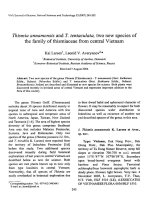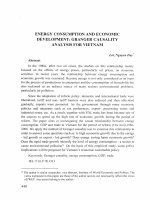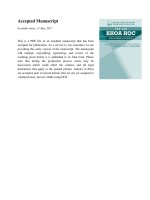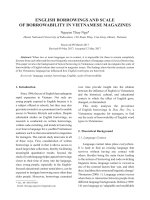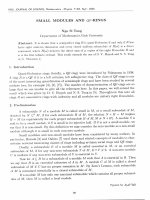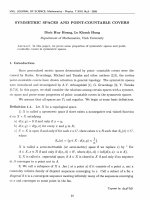DSpace at VNU: Thismia annamensis and T.tentaculata, two new species of the family of thismiaceae from central Vietnam
Bạn đang xem bản rút gọn của tài liệu. Xem và tải ngay bản đầy đủ của tài liệu tại đây (1.65 MB, 8 trang )
v \ 'ư Journal of Science, Natural Sciences and Technology 23 (2007) 245-252
Thismỉa annamensis and T. tentaculata, two new species of
the family of thismiaceae from C e n tra l Vietnam
Kai Larsen1, Leonid V. Averyanov2’*
1Botanical Institute, University o f Aarhus, Denmark
2Komarov Botanical Institute. Russian Academy o f Science, Russia
R eceived 7 A ugust 2006
Abstract. Two new species of the genus Thismia (T h ism iaceae) - T. annamensis (Sect. Euthừmia
Schltr., Subsect. Odoardoa S chltr.) and T. tentaculata (Sect. Euthismia Schltr., Subsect.
Brunonithismia Jonker) are described and illustrated as new species for Science. Both plants were
discovered recently in lowland areas of cenữal Vietnam and represents important addition to the
flora of this country.
to their dw arf habit and ephemeral character of
flowers. It may be reasonably to expect for both
discovered species wider distribution in
Indochina as well as existence o f anoứier not
yed described species o f the genus in this area.
The genus Thismia Griff. (Thismiaceae)
includes about 30 species distributed mainly in
tropical zone o f Asia and America with few
species in subtropical and temperate areas of
North America, Japan, Taiwan, New Zealand
and Tasmania [1-4]. The area o f highest species
diversity o f this genus comprises Southeast
Asia area that incluđes Malacca Peninsular,
Sumatra, Java and Kalimantan. Only two
species o f the genus ( Thismia javanica J.J. Sm.,
and T. mirabilis K. Larsen) were reported from
the territory o f Indochina Peninsular [5,6]
beíore this study. Two additional species
discovered recently during fíeld botanical
explorations o f last years in Central Vietnam are
described below as nevv for Science. Both
species are rare plants known up to now only
from type localities in cenừal Vietnam.
Noteworthy, that all species o f Thismia are
easily overlooked in botanical exploration due
/. Thismia annam ensis K. L arsen et Aver.,
sp. nov.
Type: V ietnam , Dak Nong Prov., Dak
Giong Distr., Dak Plao Municipality, the
territory o f Ta Dung Nature Reserve, steep hill
slopes at elevation 700-750 m a.s.l. around
point 11°51’4 7 ” N 107°56’59” E. Secondary
open broad-leaved evẹrgreen forest with
bamboo
and
Pirtus
kesiya.
Teưestrial
achlorophyllous brownish saprophytic herb in
shady place. Flowers light brown. Very rare. 4
November 2005, L. Averyanov, T.v. Thao,
N.T. Vinh, HLF 5510 (LE), d-EXSICCATES
OF VIETNAMESE FLORA 0036/HLF 5510.
* Corresponding author. Tel.: 007-812-3463643
E-mail: av_leonid@ m ail.ru
245
246
K . L a rsen ,
L.v. A v e r y a n o v / T ạ p c h í K hoa h ọ c Đ H Q G H N , K h o a học T ự
Diagnostic
íeatures.
Stem
simple,
unbranched; pedicels 8-28 mm long; perianth
tube pyriíòrm, 10-14 mm long, 8-11 mm wide;
free part o f sepal and petal unequal, sepal lobes
broadly rhomboid, petal lobes naưovvly
rhomboid; stigma-lobes narrow, ligulate,
bidentate at apex.
Characteres diagnosticỉ. T. racemosae
Ridl. ạffìnis, a qua differt caule simplice,
pedicellis longiorbus, Jĩoribus duplo mạịoribus,
tubo perianthii pyriforme, lobis sepalorum late
rhombeis, lobis petalorum angusíe rhombeis,
lobis stigmatis angustis, ligulatis, ad apicem
bidentatis.
Small achlorophyllous mycotrophic herb.
Roots few, white to yellowish-gray, íleshy,
branching, vermiíorm, clustering along short
horizontal rhizome bearing 1-3 orthotropic
stems. stera light yellowi$h-brown, simple,
glabrous, erect or ascending, 6-9 cm tall, with
many imbricate bract-like leaves and 1-7
flowers in loose terminal cincinnus. Leaves and
íloral bracts light yellowish-brown, narrowly
triangular to narrowly ovate, acute, adpressed to
the stem, 4-12 mm long, 0.8-5 mm wide.
Pedicel white, 8-28 mm long, conical; pedicel
and ovary longitudinally fmely grooved and
irregularly dentate along ribs. Flowcrs
actinomorphic, urceolate, o f 6 tepals fused in
form a basal perianth tube, free apically; bclow
the flowers 2-3 bracts íorming loose involucre.
P erỉanth tube pyriforin, 10-14 mm long, 8-11
mm wide near the apex, chestnut-brovvn,
longitudinally íìnely grooved with 12 low
rough deep brown ribs, inside with longitudinal
bars connected by many short transverse bars,
at the apex with narrow, prominent, íleshy,
olive-brown annulus. Free parts o f perỉanth
lobes rhomboid; outer lobes broadly rhomboid,
6-8 mm long and broad; inner lobes narrowly
rhomboid, 7-9 mm long, 3-4 mm wide; both
outer and inner lobes irregularly finely
crenulate along margin, terminated at the apex
into straight or slightly arcuate fíliform process
6.5-9 mm long. Filaments 6, arising from
thickened margin o f the perianth tube, down
N h iê n v à C ô n g n g h ệ 23 (2 0 0 7 ) 2 4 5 -2 5 2
curved, connate together into an anther tube 45.5 mm long, hanging at an annulus in the
perianth throat. Individual íìlam ents whitish,
hyaline, broad, ribbon-like, at the apex with 5
narrow tooth-like processes (among them 2
obtusely clavate and 3 acuminate), bearing at
the middle large anther with two thecae and
laterally with two small round glands; on inner
side o f filament, below anther, with broadly
cordate petaloid appendage, wider than stamen,
íĩnely denticulate along margin. Style black,
slender, short, 2-2.5 mm long, cylindrical,
persistent, bearing at apex 3 narrow ligulate,
bidentate, incurved and converging, glabrous
stigma-lobes. O vary deep brown to black,
broadly obconical, 4-6 mm long; the 3
placentas inserted parietally in the basal part of
the ovary. F ru it deep brown to black, fleshy
cupule, crowned by the persistent, íleshy, basal
ring o f the pcrianth tube and the style with
stigmas. Seeds light yellowish-brown, ellipsoid,
0.3-0.3.5 mm long, with long naưow processcs
o f testa at poles. Fig. 1.
Etym ology. Species name reíers area of its
distribution, which includes mainly lowland and
montane regions o f Central Vietnam (Annam).
Flow ering. October - November.
Ecology.
Terrcstrial
achlorophyllous
saprophytic herb. Primary and secondary broadleaved evergreen íorests often with bamboo at
elevation 700 - 750 m a.s.l.
Distribution: VEETNAM, Dak Nong Prov.,
Dak Giong Distr. Fig. 3.
Note. Among described species of the
genus, Thismia annamensis may be compared
solely with T. racemosa Ridl. once collected in
Malacca Peninsular (near Pahang). According
to treatment by F.p. Jonker (Jonker, 1948) new
species belongs to Sect. Euthismia Schltr.,
Subsect. Odoardoa Schlừ. It diíĩers in simple
stems, long pedicels, twice larger flowers and in
unequal sepal and petal lobes. Alone small
colony o f this very rare plant was found in
shady humid wet place along forest trail. Hard
persistcnt attempts to fmd more specimens were
ữuitless.
K. L a rsen ,
L.v. A v e r y a n o v /
T ạ p c h í K h o a h ọ c Đ H Q G H N , K h o a học T ự N h iê n v à C ô n g n g h ệ 2 3 (2 0 0 7 ) 2 4 5 -2 5 2
247
Thlsm kt m n a im n t u Typc HLF95IO
Fig.l. Thismia annamensis K. Larsen et Aver. - a. Flowering plant; b. Flower, view from the top;
c, d. Longitudinal section of the flower; e. Longitudinal section of the flower with recurved half of stamen tube;
f. Ovary; g. Longitudinal scction of ovary; h. Ripening ữuit; i. Seeds. (all drawn from the type by Leonid V.
Averyanov).
248
K. L a rsen ,
L.v. A v e r y a n o v / T ạ p c h í K hoa h ọ c Đ H Q G H N , K hoa h ọ c T ự
2. Thismia tentaculaía K .L arsen et Aver.,
sp.nov.
Type: Vietnam, Quang T ri Prov., Da
Krong Disừ., Huc Nghi Municipality, in
vicinities o f La To village around point
16°29’16” N 107°00’32” E at elevation about
414 m a.s.l. Primary broad-leaved evergreen
lowland forest on montane hills composed with
shale. Terrestrial white ground saprophyte on
shady stream slope. Flowers light yellovvish,
petal tips dull reddish, disc brightly yellow.
Very rare. 26 March 2006, L.Averyanov,
P.V.The at al., HLF 6251
(LE), dEXSICCATES OF VIETNAMESE FLORA
0058/HLF 6251.
Diagnostic íeatures. Perianth tube pure
white; niament apex bidentate, not hairy; inner
suríace o f perianth tube finely iưegular
manicate-rugulose without transverse bars;
stigma-lobes ovate retuse at apex.
C haractcres dỉagnostỉcỉ. T. javanicae J. J.
Smith et T. arachniti Ridl. ajfinis, a qua differt,
tubo perianthii laete albo, intra irregulariíer
manicato-ruguloso
sine
transtrừ
transversalibus,
apicibus
filamentorum
bidentatis, glabris, lobis stigmatis ovatis, ad
apicem reíusis.
Small achlorophyllous m ycotrophic herb.
Roots few, light brown, íleshy, venniform,
clustering at ửie base o f stem. Stem white,
simple, glabrous, erect or ascending, 2-7 cm
tall, with few distant bract-like leaves and 1-3
terminal flowers. Leaves and Aoral bracts
white, narrowly triangular, acute, adpressed to
the stem, 2-8 mm long, 0.5-2 mm wide. Ovary
and pedỉcel white, 6-8 mm long, conical,
longitudinally ĩmely grooved and irregularly
N h iê n v à C ô n g n g h ệ 2 3 (2 0 0 7 ) 2 4 5 -2 5 2
dentate along ribs. FIowers actinomorphic,
urceolate, o f 6 tepals fused in form a basal
perianth tubc, free apically. P erianth tube
broađly conical to obovate, 8-12 mm long, 5-7
mm wide near the apex, pure white,
longitudinally fmely grooved with 12 low
rough ribs, inside with finely irregular
manicate-rugulose suríace without transverse
bars, at the apex with broad, prominent, íleshy,
brightly yellow annulus. Free p arts of outer
p erian th lobes of nearly isosceles triangle
form, 1.8-2.4 mm long, light yellowish, with
broadly obtuse or rounded apex. Free p a rts of
inner p erian th lobcs triangular, with broad
light yellowish base 2.5-3 mm wide, tapering at
apex into long, red, íiliíorm, tentacle-like
process 14-16 mm long, with articulation near
the base. Filam ents 6, arising from thickened
margin of the perianth tube, down curved,
connate together into an anther tube 4.5-5 mm
long, hanging at an annulus in the perianth
throat. Individual íilam ents white, yellow at
the base, broad, ribbon-like, at the apex with
two distinct teeth, with no papillae, bearing at
the middle large anther vvith two thecae and
laterally with two round glands; on inner side of
filament, below anther, with broadly cordate
petaloid appendage, wider than stamen, íĩnely
crenulate along margin. Style white, thick,
short, 1.2-1.6 mm long, cylindrical, persistent,
bearing at apex 3 simple, hardly notched, íĩnely
papillose, ovate stigma-lobes. O vary white,
obconical or obovoid; the 3 placentas inserted
parietally in the basal part o f the ovary. F ruit
white to light brownish, íleshy cupule, crowned
by the persistent, íleshy, basal ring of the
perianth tube and the style with stigmas. Seeds
ellipsoid, 0.2-0.3 mm long, with short narrow
processes of testa at poles. Fig. 2.
K. L arsetĩ,
L.v.
A verya n o v
/ Tạp
c h í K hoa h ọ c Đ H Q G H N , K hoa học T ự N h iê n v à C ô n g n g h ệ 2 3 (2 0 0 7 ) 2 4 5 -2 5 2
249
0.5 mm
Thiim ta u n h M n la u . T yp e H LF 6251
Fig. 2. Thismia tentaculata K. Larsen et Aver. - a. Flowering plant; b. Flower, view from the top;
, d. Longitudinal section of the flower; e. Longitudinal section of the flower with recurved half of stamen tube;
f. Stamen, dorsal suríace (tumed in flower inside); g. Stamen, ventral suríace (tumed in flower outside);
i. Style in ovary (h) and in ripening fruit (i); j. Ripening fruit; k. Apex of the ripening fruit; 1. Seeds. (all drawn
from the type by Leonid V. Averyanov).
250
K . L a rsen ,
L.v. A v e r y a n o v /
T ạ p c h í K h o a h ọ c Đ H Q G H N , K hoa học T ự N h iê n v à C ô n g n g h ệ 23 (2 0 0 7 ) 2 4 5 -2 5 2
Etymology. Plant name reílects funny
resemblance o f inner perianth segments
processes to tentacles o f boiled shrimp.
FIowering. February - March.
Ecology.
saprophytic
Terrestrial
achlorophyllous
herb.
Primary
broad-leaved
evergreen lowland forests on montane hills
composed with shale along shady streamlet
valleys at elevation 400 - 500 m a.s.l.
Disừibution: VIETNAM, Quang Tri Prov.,
Da Kxong Disừ. Fig. 3.
Fig. 3. Localities of Thismia annamensis and T. tentaculata on the map of Vietnam.
Geographical position of discovered populations designated on the map with black round for
Thismia annamensis and with black ưiangle for T. tentaculata.
K . L a rs e n , L . v . A v e r y a n o v / T ạ p c h i K hoa h ọ c D H Q G H N , K h o a h ọ c T ự N h iê n v à C ô n g n g h ệ 2 3 (2 0 0 7 ) 245-252
Note. According to the treatment of
F.P.Jonker (Jonker, 1948) Thismia tentaculata
belongs to Sect. Euthismia Schlechter, Subsect.
Brunonithismia Jonker. This new species is
most similar to Thismia javanica J.J.Smith
distributed on Java and Sumaừa and T.
arachnithes Ridl. from Malacca Peninsular.
From these closely related species, T.
tentaculata diíTers in bidentate, not hairy apex
of íĩlaments, finely irregular manicate-rugulose
inner suríace o f perianth tube vsáthout
transverse bars and in pure white perianth tube.
Most probably, alone record o f the genus
Thismia from Vietnam reported under the name
T. javanica (Pham-Hoang Ho, 2000) belongs to
this
new
species.
Discovered
species
undoubtedly is very rare plant. It was íound 2
specimens only growing on shady humid slope
o f small íorest stream. Many day attempts to
fĩnd more specimens gave no results.
Acknomledgements. Field and laboratory
studies, results o f which are presented in this
paper were made according to investigation
program o f Vietnamese Botanical Conservation
Program
supported
Foundation (U.S.A.).
from
Henry
251
Luce
R eíerences
[1] H.N.
Ridley,
T h ừ m ia .
F lora
of
M aỉay
P en in su la r. Vol. 4. L. Reeve & Co. London,
1924 p. 307-308.
[2] F.p. Jonker, B u rm a n n ia cea e. In Flora Malesiana.
S e r.l. Vol. 4. Batavia. Noordhoff-KolfT N .v . p.
13-26. 1948.
[3] z. Yangs, R.M .K. Saundcrs, C.J. Hsu,
ta iw a n en sis
sp.
nov.
Thism ia
(Burm anniaceae
tri be
Thismieae): fírst record of thc tribe in China.
Syst. Bot. Vol. 273. 2002. p. 485-488.
[4] H. Tsukaya, H. Okada, Thism ia m ullerensis
(B urm anniaccae), a ncw specics from Muller
Range, Central Kalimantan. Acta Phytotax.
Gcobot. Vol. 56. No 2.2005. p. 129-133.
[5] K. Larsen, S tu d ies in th e F lora o fT h a ila n d 27.
T hism iaceae. Dansk. Bot. Ark. Vol. 23. 1965. p.
169-174.
[6] Pham
Hoang Ho, A n Illu stra ted F lora o f
V ietnam . Vol. 3. Tre Publishing housc, Ho Chi
M inh, 2000. 1020p.
Thismia
annamensis và T. tentaculata, hai> loài mới thuộc họ
r
__
tiêt my Thismiaceae phát hiện được ở miên Trung Việt Nam
Kai larsen1, Leonid V . averyanov2
1Viện thực vật học, Trường Đại học Aarhus, Đan Mạch
2Viện thực vật học Kụmarốp, Viện Hàn lâm khoa học Liên bang Nga
Chi Thismia Griff. Tiết M y (Fam. Thismiaceae họ Tiết My) bao gồm khoảng 30 loài phân bố chủ
yếu ờ các vùng nhiệt đới của hai châu Á và Mỹ với một số ít loài ở các vùng cận nhiệt đới và ôn đới
Bắc Mỹ, Nhật Bản, Đài Loan, Niu Dilân và Tátxmania. Bán đảo Malắcca, các đảo Xumatra, Java và
Calimantan thuộc Đông Nam Á là vùng có tính đa dạng cao nhất cùa chi này. Trước nghiên cứu này
của chúng tôi ờ bán đào Đông Dương mới biết được 2 loài (Thismia javanica J.J. Sm. và T. mirabilis
K. Larsen). Hai loài phát hiện được trong các đợt nghiên cứu mới đây ở miền Trung Việt Nam là các
loài mới cho khoa học. Chúng đều là các loài hiếm, chỉ mới gặp ở các điểm thu mẫu chuẩn. Cũng cần
252
K . L a rsen ,
L.v. A v e r y a n o v /
T ạ p c h í K hoa h ọ c Đ H Q G H N , K hoa h ọ c T ự N h iê n v à C ô n g n g h ệ 2 3 (2 0 0 7 ) 2 4 5 -2 5 2
nói thêm là tắt cả các loài cùa chi Thismia Tiết M y này dễ bị bỏ sót trong quá trình thu mẫu do kích
thước cây nhỏ và đời sống của hoa ngắn. Do đó có hy vọng một mặt 2 loài mới mô tả còn cỏ thể phân
bố rộng hơn ờ bán đảo Đông Dương, mặt khác cỏ thể tim thêm các loài khác, mới.
Thismia annamensis K. Larsen et Aver., sp. nov.
Cỏ hoại sinh màu nâu không có diệp lục, sống ờ đất nơi được che bóng. Thân đơn, không phân
nhánh; cuống hoa đài 8-28 cm; hoa màu nâu sángống tràng hình quà lê, dài 10-14 mm, rộng 8-11 mm;
phần tự do của các lá đài và cánh hoa không bằng nhau; các thùy cùa lá đài hình thoi rộng, các thùy
cùa cánh hoa hình thoi hẹp; các thùy cùa núm nhị cái hẹp, hình thìa, chẻ 2 răng ở chóp. Rất hiếm. Đã
cố gắng tìm thêm mẫu vạt nhưng không thành công. Hoa nở trong tự nhiên vào tháng 11. Mau vật
chuẩn (HLF 5510 (LE) thu ở tinh Đắc Nông, huyện Đắc Giông, xã Đẳc Plao, ở địa phận của Khu baỏ
tồn thiên nhiên Tà Đùng, trên sườn núi dốc có độ cao 700-750 m, trong rừng thứ sinh thường xanh cây
lá rộng Thông ba lá Pinus kesiya xen Tre.
Trong số các loài đã biết cùa chi thì chi có thể so sánh với T. racemosa Ridl., loài đã thu được một
lần ờ bán đảo Malácca (gần Pahang). Theo hệ thống phân loại của F.p. Jonker (Jonker, 1948) thì
Thismia annamensis thuộc về Sect. Euthismia Schltr., Subsect. Odoardoa Schltr. Tuy nhiên nó khác
với T. racemosa bời cỏ thân đơn, cuống hoa dài, hoa rộng hơn 2 lần, các thùy đài và tràng không bằng
nhau.
Thismia tentaculata K. Larsen et Aver., sp. nov.
Hoa màu vàng nhạt, chóp cánh hoa màu đo đỏ đục, đĩa tuyến mật màu vàng tươi. Bao hoa màu
trắng tuyền; chóp của chỉ nhị có 2 răng, không có lông; mặt trong cùa ống tràng có nếp nhăn-lớp lông
dày mịn, đan xen không đều và không có các vạch ngang; các thùy cùa núm nhị cái lõm nông. Mấu
vật chuẩn (HLF 6251 (LE) thu ở tỉnh Quảng Trị, huyện Đa Krông, xã Húc Nghi, gần làng La To, ở địa
phận cùa Khu bảo tồn thiên nhiên Đa Krông, ờ độ cao 414 m, trong rừng nguyên sinh thường xanh cây
lá rộng ở đất thấp trên sườn núi đá phiến sét. Cây hoại sinh ở đất ờ gần suối được che bóng. Rất hiếm;
sau nhiều ngày tìm kiếm chi thu được 2 mẫu duy nhất.
Theo hệ thống phân loại của F.p. Jonker (Jonker, 1948) thì Thismia tentaculata thuộc về Sect.
Euíhismia Schltr., Subsect. Brunonithismia Jonker. Nó gần nhất với Thismia javanica J.J. Sm. phân bổ
ờ Java và Xumatra và với T. arachnithes Ridl. Ở bán đảo Malắcca. Tuy nhiên nó khác ở chóp chi nhị
đực có 2 răng và không có lông, mặt trong cùa ống tràng cỏ nếp nhăn-lớp lông dày mịn, đan xen
không đều và không có các vạch ngang và màu trẳng tuyền của ống tràng. Rất cỏ khả năng mẫu duy
nhất của chi Tiết my Thismia được phát hiện trước đây ở Việt Nam và mang tên T. javanica (Pham
Hoang Ho, 2000) thuộc về loài mới mô tả này.
